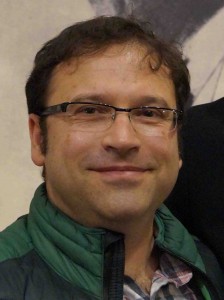
Michael Thallium, Global & Greatness Coach
Over a year ago, I wrote On my listenings (Part 1). Time flies and it was just about time for me to continue with this series of articles. I won’t repeat what I have already said in the above mentioned article, so I recommend you to read it if you didn’t yet.
The same way it happened with the great exploration voyages — I mean, one voyage came out of another one which in turn led other explorations voyages and so on —, the trip you embark on when you listen to a music work takes you to a different work and this work leads you to another one. You go from one composer to another composer, from one period of time to another period of time, from one style to another style… The important thing is not to lose the north: in my case, my north is to improve the way I listen to people through music. Below you can find a list with some of the works I have been experimenting with:
GESUALDO, Carlo (1566-1613, Italy)
Responsoria was written in 1611, two years before the gruesome death of Gesualdo, who was a prince, a count, a double murderer… and a composer. This excellent recording is performed by La Compagnia del Madrigale. It also includes madrigals by some other composers contemporary of Gesualdo — Pietro Vinci (1525-1584), Luzzasco Luzzzaschi (1545-1607), Giovanni de Macque (1548/50-1614) and Luca Marenzio (1553-1599) — which are carefully placed among Gesualdo’s lithurgical chants. Glossa, 2014.MONTEVERDI, Claudio (1567-1643, Italy)
Books of Madrigals nos. 2, 3 & 5 performed by the Italian vocal ensemble Delitiae Musicae conducted by Marco Longhini. This recordings are delicious and more than one person will be surprised when listening to them. Naxos, 2004-2006.Book of Madrigals no. 8 “Madrigali guerrieri ed amorosi” beautifully performed by Concerto Vocale conducted by René Jacobs. Harmonia Mundi, 2002.
SCHÜTZ, Heinrich (1585-1672, Germany)
History of the Resurrection (Auferstehungshistorie). This work was written in Dresden, in 1623, during the War of the Thirty Years (1618-1648), a war that devastated central Europe. This recording is performed by the Dresdner Kammerchor, The Sirius Viols and the ensemble Instrumenta Musica, all conducted by Hans-Christoph Rademann. Carus, 2014.Musical Exequies (Musicalische Exequien), is a wonderful work written in Dresden, in 1636, during the devastating War of the Thirty Years (1618-1648). The Prince Heinrich von Reuss organised every single detail for his own funeral, from the music to be sung — composed by Schütz — to the coffin. It is brilliantly performed by the Belgian vocal ensemble Vox Luminis conducted by Lionel Meunier.
BUXTEHUDE, Dietrich (1637-1707, Germany/Denmark)
Ciaccona: il mondo che gira is a recording which includes different works by Bustehude: five sonatas, one passacaille, one ciaccona and two cantatas superbly performed by Stylus Phantasticus. Alpha, 2002.ZELENKA, Jan Dismas (1679-1745, Bohemia)
Responsoria pro hebdomada sancta & Lamentatio Ieremiae Prophetae, brilliantly performed by Collegium Vocale 1704 & Collegium 1704 conducted by Václav Luks. Accent, 2012.Officium defunctorum & Requiem performed by Collegium Vocale 1704 & Collegium 1704 conducted by Václav Luks. Accent, 2011.
I think Zelenka deserves a much better place in music history.
HÄNDEL, Georg Friedrich (1685-1759, Germany/England)
Brockes Passion performed by the Kölner Kammerchor and the Collegium Cartusianum conducted by Peter Neumann. Carus, 2010.BACH, Johann Sebastian (1685-175o, Germany)
Goldberg Variations performed by the harpsichordist Kenneth Weiss. It is a live recording of a concert that took place in 2008. Satirino, 2008.Musical Offering performed masterly played by the Italian ensemble Il Gardellino. Passacaille, 2014.
The Art of Fugue performed by the viols ensemble Fretwork. I strongly recommend this version, it is different from most of the recordings out in the market now.
B flat minor Mass performed by the Stuttgart Baroque Choir and Chamber Orchestra conducted by Frieder Bernius. Carus, 2006.
HAYDN, Franz Joseph (1732-1809, Austria)
The complete String Quartets played by Festetics Quartet on period instruments: Istvan Kertész (violin Milanese School, 18th century), Erika Petöfi (violin Matthias Thier, Vienna 1770), Péter Ligeti (viola Matthias Albanus, Bolzano 1651), Rezsö Pertorini (violoncello Anonymous French, 17th century). The box consists of 19 CDs. Outhere, 2014.The Creation. Andreas Spering, Capella Augustina, Cologne Vocal Ensemble & Max Ciolek. Naxos, 2005.
BEETHOVEN, Ludwig van (1770-1827, Germany)
The complete piano concertos performed by the pianist Paul Lewis and the BBC Symphony Orchestra conducted by Jiří Bělohlávek. Harmonia Mundi 2010.BRITTEN, Benjamin (1913-1976, United Kingdom)
The Turn of the Screw. Peter Pears (tenor), Jennifer Vyvyan (soprano), David Hemmings (trebble), Olive Dyer (soprano), Joan Cross (soprano), Arda Mandikian (soprano), English Opera Group Orchestra conducted by Benjamin Britten himself. Decca, 1955.
Death in Venice. Philip Langridge (tenor), Alan Opie (baritone), Michael Chance (counter-tenor), BBC Singers, City of London Sinfonia conducted by Richard Hickox. Chandos, 2005.
Suites for Cello played by Daniel Müller-Schott. Orfeo 2011.
GUBAIDULINA, Sofia (1931- , Russia)
Repentance is an excellent recording and includes Gubaidulina’s works from different periods: Serenade for solo guitar (1960), Piano Sonata (1965), Repentance (2008) and Sotto Voce (2010/13). Bis, 2014.
I will come back to you in the future and let you know about the works which have helped me improve my listening skills. Remember: an experiment is a trip that can take you to unsuspected places.
Michael Thallium
Global & Greatness Coach
Book your coaching here
You can also find me and connect with me on:
Facebook Michael Thallium and Twitter Michael Thallium
